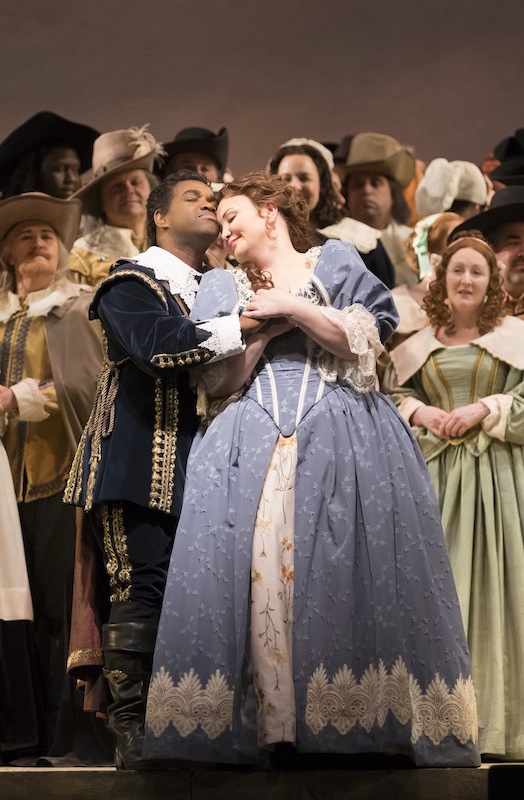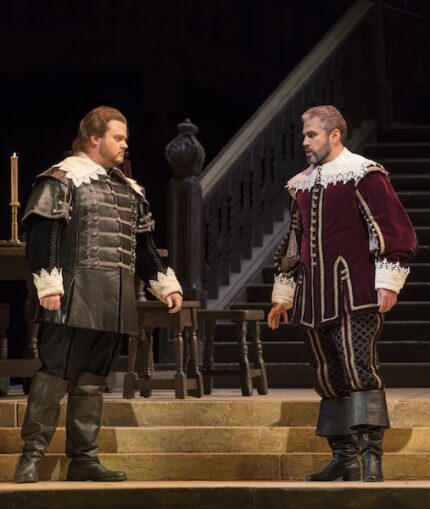Inspired cast delivers the vocal thrills in Lyric’s picturesque “Puritani”

With an intermittently raging snowstorm in downtown Chicago on Sunday, one settled into the warmth of the Civic Opera House all set for that rarest of animals–a bel canto opera with a happy ending.
Lyric Opera’s estimable cast eventually delivered the vocal goods at the opening matinee of Bellini’s I Puritani. But the show took a while to get on track—perhaps not surprising since there was as much drama offstage as on this past week.
Conductor Enrique Mazzola had to undergo emergency gall bladder surgery last Monday, less than a week before the opening. The Italian conductor got out of his hospital bed and returned to duty within days, leading both Thursday’s dress rehearsal as well as Sunday’s opening performance of Bellini’s 3-1/2-hour opera. What a trouper!
Lyric Opera had enjoyed significant history with Bellini’s long-neglected swan song. Most famously, the company presented Puritani in just its second season in 1955 with Maria Callas and Giuseppe Di Stefano–a production that did much to help the neglected work’s revival.
The typically implausible plot takes place during the 17th century English Civil Wars. Our heroine Elvira is caught between her love for the Royalist Arturo and her arranged marriage to the Puritan Riccardo. When she mistakes Arturo’s escorting of the captured English queen to safety for a romantic betrayal, Elvira goes insane. She regains her sanity when all is explained, sort of goes mad again, and then is restored to sanity for good–or at least until the joyful scene at the final curtain.
Never mind. As usual in the genre, the melodramatic plot serves as scaffolding for Bellini’s glorious music. Tragically, the composer would die months after Puritani’s successful premiere, at age 33. In his final opera, one can see Bellini’s style taking on a new grandeur and sophistication, with solo arias often morphing into quartets and full ensembles with chorus. Puritani has long been regarded as a soprano showcase, largely because of traditional cuts that reduce the other characters’ music. But Bellini’s final opera is a true ensemble piece with rich opportunities for all its principals.
Caution seemed to be the watchword in the early going at Sunday’s opening performance, which felt a bit flat in Act 1. Aided by Mazzola’s fiery and idiomatic conducting, the performance grew in both vitality, dramatic grip and vocal excitement as the afternoon unfolded, ultimately serving Bellini’s music in high style.
Albina Shagimuratova has become Lyric Opera’s go-to soprano for bel canto rep, most recently heard in the company’s acclaimed Lucia di Lammermoor in 2016. The Russian soprano did everything she needed to do in this challenging role, singing with refined, pearly tone and handling all the vocal challenges and stratospheric writing with aplomb.
Still, Shagimuratova’s singing too often seemed merely polished and technically competent rather than exciting. Elvira’s elated “Son vergin vezzosa” went with pinpoint articulation and nimble facility but she passed on the showier opportunities for coloratura brilliance here and elsewhere. What is an Elvira without some vocal audacity and fireworks?
Madness seemed to become Shagimuratova, with the singer improving in characterization and singing with freer vocal expression as Elvira becomes unhinged. Her “Qui la voce … Vien, diletto” was beautifully rendered, subtle and touching in her characterization of the psychologically damaged girl. Shagimuratova even made Elvira’s mental yo-yo-ing in the final act seem credible and affecting rather than merely annoying, and she brought a greater vocal panache and true sense of joyous release to the final love duet.
It was Lawrence Brownlee as Arturo, Elvira’s true beloved, who provided the most consistent vocal thrills. One would ideally have liked a smoother legato line in “A te, o cara,” but otherwise his singing was faultless—plangent and ringing of tone, warmly expressive and produced with wonderful ease. Brownlee commanded the stage from the curtain of Act 3; his “Corre a valle, corre a monte” was a virtual bel canto seminar and the tenor nailed Arturo’s infamous high F in the final ensemble (“Credeasi, misera”) with a resounding attack and clarion tone that earned him the loudest ovation of the afternoon.

Taking the role of Arturo’s rival, Riccardo, was Anthony Clark Evans. The character of Elvira’s rejected suitor is a more complex, rounded figure than the genre’s usual Baritone Bad Guy. Evans’s somewhat rudimentary acting skills didn’t make much of the opportunities to flesh out the role. The Ryan Center alumnus—who resembled a young Bryn Terfel in costume–has a solid, rather burly baritone but was fitfully underpowered in ensembles and lacked some of the necessary agility for the role.
As Giorgio, Adrian Sâmpetrean proved ideal casting. The tall Romanian singer cut an imposing, dignified figure as Elvira’s sympathetic uncle. Possessed of an ample yet refined bass, he delivered a stirring “Suoni la tromba” duet with Evans. Sâmpetrean is also a fine actor who conveyed a nice, understated compassion in Act 2 as Elvira loses her grasp on reality.
Lauren Decker was a mixed blessing as the hostage queen Enrichetta. The Ryan Opera Center member showed a full-bodied mezzo yet her singing was unevenly projected in ensembles. She also slipped while bending and wound up sitting on the stage, though she quickly recovered a more regal position.
Alan Higgs was a serviceable Lord Walton, Alec Carlson a lightweight Bruno.
The borrowed Met production is uber-traditional but atmospheric and effective. From the framed opening tableau of the English countryside, Ming Cho Lee’s handsome period sets provided a picturesque feast, as with the paneled monastic gloom of Giorgio’s apartment. Especially striking was Ho’s atmospheric design for the castle’s great hall–the massive high central staircase and the claustrophobic side walls nicely reflected Elvira’s isolation and encroaching madness. Peter J. Hall’s elaborate period costumes added to the visual splendor.
The best compliment one can pay Eric Einhorn is that his stage direction was barely noticed. That’s a testament to his unforced yet viable way of blocking and moving the principals to convey the opera’s drama naturally without drawing attention to itself.
The chorus is a major character in this opera, onstage almost constantly in two of the three acts and observing and commenting on the action. Michael Black’s singers were fully up to the prominent assignment, singing with robust power, flexibility and expressive engagement throughout.
From the brass clam in the opening bars, there were more ensemble slips than one usually hears from the Lyric Opera Orchestra. But for most of the performance, the musicians played to their usual high standard–not least the gleaming trumpet solo in “Suoni la tromba.”
In this production, the company is doing an on-stage scene change between Acts 2 and 3, so stick around for an example of the backstage crew’s highly efficient practical magic.
I Puritani runs through February 28. lyricopera.org; 312-827-5600.
Posted in Performances





Posted Feb 13, 2018 at 5:01 pm by LC
If you want a very traditional production, go for it. I hated it! Loved the singing but the set and the direction, did not care for it. I usually see operas twice but not with this particular production.
Posted Feb 19, 2018 at 12:59 pm by Jizungu
LC, I agree! The staging was conventional, with lots of park-and-bark complemented by silly, aimless stage movements: soldiers marching across the stage and back again; Puritans locking arms in a circle to dance a tarantella; the tenor hiding from pursuers behind a skimpy fountain that left him plainly visible. It looked like a parody of Italian opera: Il Trovatore as staged in Night at the Opera (made even more ridiculous by the contrast between the diminutive tenor and the statuesque leading ladies). The student-rush ticketholders sitting around us tittered throughout, with good reason.
Posted Feb 19, 2018 at 1:04 pm by Jizungu
PS: On Friday 2/16, Shagimuratova bowed out after the first act, “indisposed,” and the understudy took over. (I did not catch the latter’s name.) Does anyone know if AS will return for the remainder of the run?
Posted Feb 19, 2018 at 5:01 pm by Lawrence A. Johnson
Eglise Gutierrez was the cover on Friday. Without providing any details on Albina Shagimuratova’s indisposition, a Lyric spokeswoman said Monday that the Russian soprano will perform the next “Puritani” performance on the 24th as scheduled.